 |
 |
 |
 |
 |
 |
| |
 |
|
 |
 |
 |
  |
  |
 |
 |
 |
 |
|
|
 |
|
 |
 |
 |
BUILDING |
 |
|
 |
|
 |
 |
 |
| |
 |
| 
 |
Superkilen
|
|
 |
 |
 |
 |
DESIGNER |
 |
|
|
 |
|
 |
 |
 |
| |
 |
|
 |
 |
 |
 |
CONTEXT |
 |
|
|
 |
|
 |
 |
 |
| Panorama |
 |
|
 |
|
 |
 |
 |
|
 |
|
| Overview |
 |
|
 |
|
 |
 |
 |
|
 |
|
| Masterplan |
 |
|
 |
|
 |
 |
 |
|
 |
|
| Relationship with the location |
 |
|
 |
|
 |
 |
 |
 |
 |
 |
 |
DESCRIPTION |
 |
|
|
 |
|
 |
 |
 |
| . |
 |
|
 |
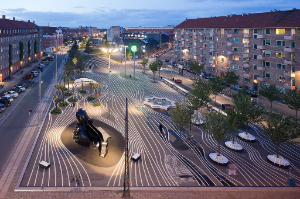 The urban park by BIG + TOPOTEK1 + SUPERFLEX conceived as a giant exhibition of urban best practice by incorporating everyday objects from more than 60 different cultures, constitutes a rare fusion of architecture, landscape and art. The urban park by BIG + TOPOTEK1 + SUPERFLEX conceived as a giant exhibition of urban best practice by incorporating everyday objects from more than 60 different cultures, constitutes a rare fusion of architecture, landscape and art.
The kilometer long urban park wedges through the Nørrebro area just north of the Copenhagen city center, creating a different yet unifying space in one of the most ethnically diverse and socially challenged neighborhoods in Denmark. The aim of the invited competition initiated by the City of Copenhagen and Realdania Foundation back in 2005 was to create a truly unique urban space with a strong identity on a local and global scale. The 13.4 million euro development started construction in 2009 and opened to the public in June 2012. |
|
 |
 |
 |
|
 |
|
| . |
 |
|
 |
|
 |
 |
 |
|
 |
|
| . |
 |
|
 |
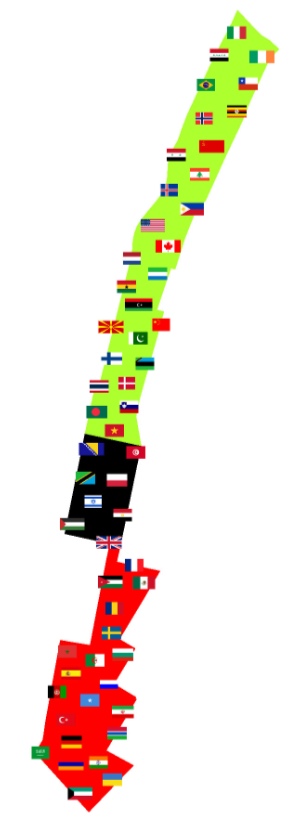 Superkilen is divided into three color-coded areas, each with a distinct atmospheric and functional condition: the large and expansive red square which serves as an extension of the adjacent sports hall offering a range of recreational and cultural activities; the black square as the heart of the Superkilen where locals can meet by the Moroccan fountain or a game of chess; and a linear green stretch as a natural meeting place for large-scale sports activities providing vantage points over the surroundings. The three areas form the backdrop to the surrealist collection of global urban diversity of more than 100 objects from 60 cultures which reflect the true nature of the local neighborhood. The objects were selected through an intensive curatorial process in close collaboration with the local population. Superkilen is divided into three color-coded areas, each with a distinct atmospheric and functional condition: the large and expansive red square which serves as an extension of the adjacent sports hall offering a range of recreational and cultural activities; the black square as the heart of the Superkilen where locals can meet by the Moroccan fountain or a game of chess; and a linear green stretch as a natural meeting place for large-scale sports activities providing vantage points over the surroundings. The three areas form the backdrop to the surrealist collection of global urban diversity of more than 100 objects from 60 cultures which reflect the true nature of the local neighborhood. The objects were selected through an intensive curatorial process in close collaboration with the local population.
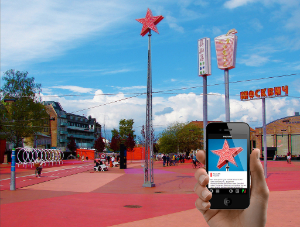 The objects ranging from exercise gear, including muscle beach LA to sewage drains from Israel, palm trees from China and neon signs from Qatar and Russia are all accompanied by a small stainless plate inlaid in the ground describing each of the objects and their origin. The objects ranging from exercise gear, including muscle beach LA to sewage drains from Israel, palm trees from China and neon signs from Qatar and Russia are all accompanied by a small stainless plate inlaid in the ground describing each of the objects and their origin.
The Copenhagen-based art group Superflex took the public participation further into the extreme by handpicking five groups of people and travelling to the country of their origin to document the process of selection.
Throughout the Superkilen red maple, Japanese cherry trees, larix, palm trees from China and Lebanese cedar trees are planted to offer more shade and vegetative interest, augmenting the existing trees. The diversity in tree and plant species complements the diversity of the site furniture.
A bike path runs through the entire park improving the infrastructure locally in the area while integrating it into the broader, citywide context. |
|
 |
 |
 |
|
 |
|
| . |
 |
|
 |
|
 |
 |
 |
 |
 |
 |
 |
POINTS OF VIEW |
 |
|
|
 |
|
 |
 |
 |
| |
 |
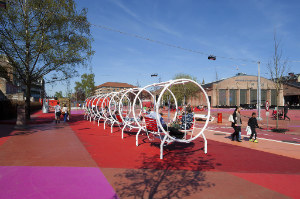 “Rather than a public outreach process towards the lowest common denominator or a politically correct post rationalization of preconceived ideas navigated around any potential public resistance – we proposed public participation as the driving force of the design leading towards the maximum freedom of expression. By transforming public procedure into proactive proposition we curated a park for the people by the people – peer to peer design – literally implemented.”
“When our team was invited to propose a project in this neighborhood we realized that we had to do more than just urban design. Rather than plastering the urban area with Danish designs we decided to gather the local intelligence and global experience to create a display of global urban best practice comprising the best that each of the 60 different cultures and countries have to offer when it comes to urban furniture.”
Nanna Gyldholm Møller, Project Leader, BIG.
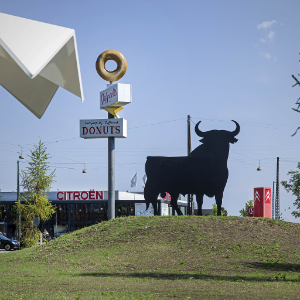 “Our mission was to find the big picture in the extreme detail of a personal memory or story, which on the surface might appear insignificant, but once hunted down and enlarged became super big. A glass of palestinian soil in a living room in Nørrebro serving as a memory of a lost land, enlarged to a small mountain of palestinian soil in the park. A distant Mediterranean flirt in the seventies symbolised by a great iron bull, hunted down and raised on a hill in the park.“
“While the Romantic Gardens of the 19th Century attempted to give the visitors an exotic experience of the world that was still big and hard to travel around – allowing people to witness a Chinese pagoda or a Greek temple – the Super Park in Copenhagen does the opposite. Rather than perpetuating a perception of Denmark as a mono-ethnic people, the Super Park portrays a true sample of the cultural diversity of contemporary Copenhagen”
|
|
 |
 |
 |
 |
VIDEO |
 |
|
|
 |
|
 |
 |
 |
| |
 |
|
An urban park project in Copenhagen divided into three main areas: The Red Square, The Black Market and The Green Park. While The Red Square designates the modern, urban life with café, music and sports, The Black Market is the classic square with fountain and benches. The Green Park is a park for picnics, sports and walking the dog.
The people living in the immediate vicinity of the park relate to more than 50 different nationalities. Instead of using the designated city objects/furnitures used for parks and public spaces, people from the area was asked to nominate specific city objects such as benches, bins, trees, playgrounds, manhole covers and signage from other countries. These objects were chosen from a country of the inhabitant’s national origin or from somewhere else encountered through traveling. The objects were either produced in a 1:1 copy or bought and transported to the site.
Furthermore, five groups traveled to Palestine, Spain, Thailand, Texas and Jamaica in order to acquire five specific objects. The objects have since been installed throughout the park. In total there are more than 100 different object encountered from more than 50 different countries.
Commissioned by City of Copenhagen and RealDania, the concept for Superkilen is developed by SUPERFLEX in collaboration with architectural firms Bjarke Ingels Group (BIG) and Topotek1.
|
|
 |
 |
 |
 |
LOCATION |
 |
|
|
 |
|
 |
 |
 |

|
 |

|
Continent |
|
 |
|
Nation |
|
 |
|
Region |
|
 |
|
Municipality |
|
 |
|
Town |
|
 |
|
District |
|
 |
|
Address |
|
 |
|
|
|
 |
|
 |
 |
 |
 |
MAP |
 |
|
|
 |
|
 |
 |
 |
| |
 |
|
 |
 |
 |
 |
|
TYPOLOGY |
 |
|
|
 |
|
 |
 |
 |
Main |
 |
|
 |
ARCHITECTURE | Urban equipment and structures for public areas
Street furniture
Pedestrian areas, promenades
|
TOWN PLANNING AND URBAN DESIGN | Urban design and urban renovation
Squares and open areas
| |
|
|
 |
|
Additional |
 |
|
 |
ARCHITECTURE | Urban equipment and structures for public areas
Structures for public areas
Monuments, decorations, furnishings, graphics
Monuments and works of art
| |
 |
 |
 |
 |
CHRONOLOGY |
 |
|
|
 |
|
 |
 |
 |
Project |
 |
|
 |
| 
 |
2005 - 2009
project winner of limited competiton
|
|
Realisation |
 |
|
 |
| 
 |
2009 - 2012 |
|
 |
 |
 |
 |
AWARDS |
 |
|
|
 |
|
 |
 |
 |
| 2013 |
 |
|
 |
Red Dot Award
Product Design
‘Best of the Best’ | Architecture & Urban Design |
|
 |
 |
 |
|
 |
|
| 2013 |
 |
|
 |
|
 |
 |
 |
|
 |
|
| 2013 |
 |
|
 |
AIA Honor Award
Regional & Urban Design |
|
 |
 |
 |
|
 |
|
| 2013 |
 |
|
 |
| ArchDaily Buildings of the Year Award |
|
 |
 |
 |
|
 |
|
| 2013 |
 |
|
 |
Architizer A+ Awards
Popular Choice Winner
Landscapes and Gardens |
|
 |
 |
 |
|
 |
|
| 2012 |
 |
|
 |
|
 |
 |
 |
|
 |
|
| 2012 |
 |
|
 |
| Architect Magazine Annual Design Review Award |
|
 |
 |
 |
 |
 |
 |
 |
THE BUILDING IN ADVERTISING |
 |
|
|
 |
|
 |
 |
 |
| Product |
 |
|
 |
 |
Ford Puma |
|
|
|
 |
 |
 |
| Company |
 |
|
 |
|
| Music |
 |
|
 |
|
| Aired |
 |
|
 |
|
| Building's role |
 |
|
 |
|
 |
 |
 |
|
 |
|
 |
 |
 |
 |
BIBILIOGRAPHIC REFERENCES |
 |
|
|
 |
|
 |
 |
 |
|
 |
| Ida Sandström, "How social can a place be?", Arkitektur 6/2019, oktober/october 2019 [Torgskräck], pp. 66-71 |
|
|
| Karsten Jørgensen, "Backflip: Superkilen, Copenhagen", Topos 105, 2018, pp. 110-111 |
|
|
| "Superkilen public space, Copenhagen, Denmark, 2012", World Architecture 320, february 2017 [2016 Aga Khan Award for Architecture], pp. 48-55 |
|
|
| Bianca Hermansen, Sophia Schuff, "Falsche Hoffnungen / False hopes", Baumeister 7/2016, juli/july 2016, pp. 34-43 |
|
|
| Li Xiaofeng, Lin Xiao, "Superkilen, Copenhagen, Denmark", World Architecture 310, april 2016 [Other than tearing down: urban regeneration and reuse], pp. 54-57 |
|
|
| Mariana Mogilevich, "Ambulante Therapie: Psychologien der Pedestrianisierung in New York und Kopenhagen / Ambulatory therapy: psychologies of pedestrianization in New York and Copenhagen", Candide 9, juni/june 2015, pp. 97-112 |
|
|
Maryse Quinton, "Le mobilier urbain se reinvente / Urban street furniture reinvented", L'Architecture d'Aujourd'hui 403, novembre/november 2014, pp. 140-148
"Superkilen, Copenhagen", L'Architecture d'Aujourd'hui 403, novembre/november 2014, pp. 142-143 (140-148) |
|
|
| "Superkilen Urban Park", L'Arca International 117, marzo-aprile/mars-avril/march-april 2014, pp. 14-23 |
|
|
| Jessica Bridger, "Life on the wedge", Landscape Architecture Magazine 7/2013, july 2013, pp. 86-99 |
|
|
| "Parque urbano Superkilen, 2007-2012, Copenhague (Dinamarca) / Superkilen Urban Park, 2007-2012, Copenhagen (Denmark)", AV Monografías / Monographs 162, julio-agosto/july-august 2013 [BIG 2001-2013], "Diez obras / Ten Works", pp. 54-59 |
|
|
Margaux Darrieus, "Dossier: Aires de jeux / Dossier: Playing ground", Moniteur Architecture AMC 225, juin-juillet/june-july 2013, pp. 77-87
"Superkilen in Nørrebro, Copenhagen", Moniteur Architecture AMC 225, juin-juillet/june-july 2013, p. 81 (77-87) |
|
|
| Elvira Reggiani, "Riqualificazione di un'area ferroviaria dismessa, Nørrebro / Superkilen urban revitalisation, Nørrebro", L'Industria delle Costruzioni 431, maggio-giugno/may-une 2013 [Copenhagen], pp. 92-97 (4-109) |
|
|
"Neue Haymat / A new homeland", Bauwelt 12/2012, 23 märz/march 2012, pp. 14-67
Henrik Reeh, "Superkilen, Nørrebro, Copenhagen", Bauwelt 12/2012, 23 märz/march 2012, pp. 60-67 (14-67) |
|
|
| Jessica Bridger, "Culture riot: Copenhagen's Superkilen", Topos 78, march 2012 [Culturescapes], pp. 41-46 (18-101) |
|
|
| Bjarke Ingels, "Public participation extreme", Perspecta 45, 2012 [Agency], pp. 127-130 (3-207) |
|
|
| "BIG, Topotek1, Superflex. Superkilen. Copehagen, Denmark (2011)", A+T 38, otoño/autumn 2011 [Strategy and Tactics in Public Space], pp. 58-65 (5-173) |
|
|
| "Superkilen [Super Wedge] community integration project, Copenhagen", Arkitektur DK 6/09, november-december 2009 [The BIG Lab], pp. 48-51 (1-63) |
|
 |
 |
 |
 |
 |
 |
 |
PHOTO+ |
 |
|
|
 |
|
 |
 |
 |
| |
 |
|
 |
 |
 |
 |
CLIENT |
 |
|
|
 |
|
 |
 |
 |
| |
 |
Copenhagen Municipality
Realdania |
|
 |
 |
 |
 |
AMOUNT |
 |
|
|
 |
|
 |
 |
 |
| |
 |
|
 |
 |
 |
 |
DIMENSIONAL
DATA |
 |
|
|
 |
|
 |
 |
 |
| Surface |
 |
|
 |
| sq.m. 33,000 (sq.ft. 32,917) |
|
| Lenght |
 |
|
 |
|
 |
 |
 |
 |
LANDSCAPE DESIGN |
 |
|
|
 |
|
 |
 |
 |
| |
 |
|
 |
 |
 |
 |
STAFF |
 |
|
|
 |
|
 |
 |
 |
Project  |
 |
| Superflex | BIG Bjarke Ingels Group |
|
|
 |
|
|
 |
|
Design concept |
 |
Superflex
Rasmus Nielsen, Jakob Fenger, Bjørnstjerne Christiansen |
|
Principal-in-charge |
 |
|
Project leader |
 |
| Nanna Gyldholm Møller, Mikkel Marcker Stubgaard [BIG] |
|
Landscape design |
 |
Topotek 1
Martin Rein-Cano, Lorenz Dexler |
|
Design team |
 |
| Ondrej Tichy, Jonas Lehmann, Rune Hansen, Jan Borgstrøm, Lacin Karaoz, Jonas Barre, Nicklas Antoni Rasch, Kai-Uwe Bergmann, Gabrielle Nadeau, Jennifer Dahm Petersen, Richard Howis, Fan Zhang, Finn Nørkjær, Andreas Castberg, Armen Menendian, Jens Majdal Kaarsholm, Jan Magasanik, Henrick Poulsen, Takumi Iwasawa, Teis Draiby [BIG] |
|
Collaborators |
 |
Help PR & Communication
Lemming & Eriksson |
|
 |
 |
 |
 |
CREDITS |
 |
|
|
 |
|
 |
 |
 |
| |
 |
Photos © Iwan Baan, Superflex, Torben Eskerod, Jens Lindhe
Drawings © BIG Bjarke Ingels Group
Video © Superflex
Text edited by BIG Bjarke Ingels Group
Courtesy of BIG Bjarke Ingels Group, Superflex
|
|
 |
  |
 |
|
|